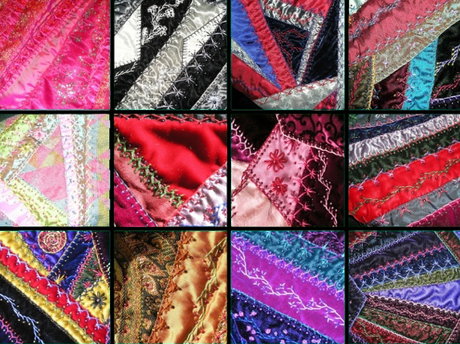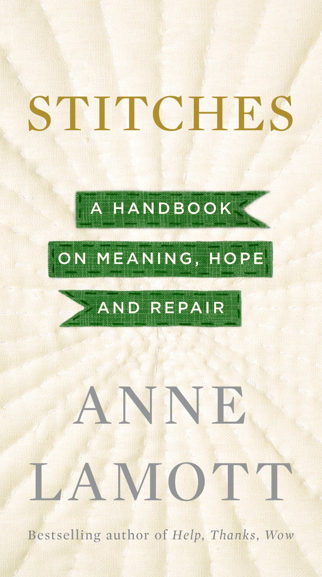Anne Lamott totally stole my metaphor.
No, not really. But her new book, Stitches: A Handbook on Meaning, Hope and Repair, plays with the metaphor that made me choose that particular photograph for my masthead and, moreover, explains my love of quilts, especially the kind made from bits of cast-off clothes or leftover scraps that aren’t good for anything until they are stitched together into something beautiful. On the wall of my mother in law’s house hangs a gorgeous old ‘crazy’ quilt that was nearly tossed into the trash; it’s likely over a hundred years old, and that’s probably my favorite kind of quilt: jaggedy lines, clashing colors, and unusual embroidery tying it all together into a startling mosaic of color and texture.

Crazy Quilt Mosaic via Flickr. By Buttersweet.
Anyway: Anne Lamott’s newest book is very small. And it came out so soon after her last book that I was tempted to dismiss it, like, “how could anything good be produced so quickly?” Recently I read a review in which the reviewer dismissed Anne Lamott, saying that each of her books is basically the same. I admit that I wondered if this was just going to be a volume of so much recycling. And while all the classic Lamott themes are there, this book moved me more deeply than perhaps any of her spiritual essays since Traveling Mercies. It’s small, but it really packs a punch, not least in dealing with the problem of pain in a way that’s conversational, witty, and wise.
Here are some of my favorite lines and passages:
When something ghastly happens, it is not helpful to many people if you say that it’s all part of God’s perfect plan, or that it’s for the highest good of every person in the drama, or that more will be revealed, even if that is all true. Because at least for me, if someone’s cute position minimizes the crucifixion, it’s bullsh*t. Which I say with love.
Christ really did suffer, as the innocent of the earth really do suffer. It’s the ongoing tragedy of humans. Our lives and humanity are untidy: disorganized and careworn.
My understanding of incarnation is that we are not served by getting away from the grubbiness of suffering.
Any healthy half-awake person is occasionally going to be pierced with a sense of the unfairness and the catastrophe of life for ninety-five percent of the people on this earth.
Pretending that things are nicely boxed up and put away robs us of great riches.

To get back to what this all has to do with crazy quilts and such: there is so much brokenness in the world, and our ability to stitch it all up is incomplete and impermanent. But while we are waiting for all things to be made new, we find hope and healing in the connections we make with one another, and with God: paying attention to the extravagant beauty in the most ordinary things, sharing a meal, being kind. These are stitches. This is grace.
I highly recommend it, but Mom: don’t buy yourself a copy. I’m sending you one for Christmas.
